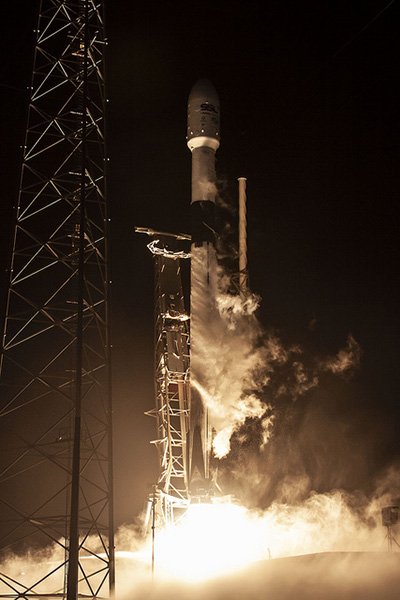SpaceX Launches Indonesia’s Satellite, Moon Lander
 Cape Canaveral Air Force Station, Florida, Feb. 22, 2019 — SpaceX successfully launched Indonesia's Nusantara Satu satellite from Space Launch Complex 40 (SLC-40) at Cape Canaveral Air Force Station, Florida at 8:45 p.m. EST, or 1:45 UTC on February 22. Falcon 9 also delivered the Beresheet lunar spacecraft and Air Force Research Laboratory (AFRL) S5 spacecraft to orbit.
Cape Canaveral Air Force Station, Florida, Feb. 22, 2019 — SpaceX successfully launched Indonesia's Nusantara Satu satellite from Space Launch Complex 40 (SLC-40) at Cape Canaveral Air Force Station, Florida at 8:45 p.m. EST, or 1:45 UTC on February 22. Falcon 9 also delivered the Beresheet lunar spacecraft and Air Force Research Laboratory (AFRL) S5 spacecraft to orbit.
Deployments occurred at approximately 33 and 44 minutes after liftoff.
Falcon 9’s first stage for the Nusantara Satu mission previously supported the Iridium-7 mission in July 2018 and the SAOCOM 1A mission in October 2018. Following stage separation, SpaceX landed Falcon 9’s first stage on the “Of Course I Still Love You” droneship, which was stationed in the Atlantic Ocean.
SSL built the Nusantara Satu satellite for PT Pasifik Satelit Nusantara (PSN), a leading Asian provider of satellite-based telecommunication services. Nusantara Satu is Indonesia’s first high-throughput satellite that will serve to improve internet connectivity in the region. Additionally, the satellite’s C-band and Ku- band transponders will be used for voice and data communications and video distribution throughout the Indonesian archipelago.
In order to bring a secondary payload to orbit, SSL designed Nusantara Satu using its next-generation electric propulsion system. The launch demonstrates SSL’s ability to take small rideshare satellites to geostationary orbit efficiently and economically.
SpaceIL’s lunar spacecraft Beresheet (Hebrew for “in the beginning”), which competed in the Google Lunar XPrize, will be the smallest spacecraft to ever land on the Moon, at only 1,322 lbs, or 600 kgs. Upon deployment, it will travel to the Moon using its own power, a voyage that will take nearly two months. Once it arrives, Beresheet will be Israel’s first spacecraft and the world’s first privately-funded spacecraft to reach the Moon. Its mission is to transmit photos and video of its new home and conduct scientific measurements.
The Air Force Research Laboratory (AFRL) S5 experimental small spacecraft, developed and integrated by Blue Canyon Technologies, will carry out a one-year mission. The S5 mission leverages commercial advances and services in a rapid demonstration of small satellite capabilities.
Related Articles:
Gregg Daffner Elected APSCC President
Spacex Launches 64 Satellites Successfully





